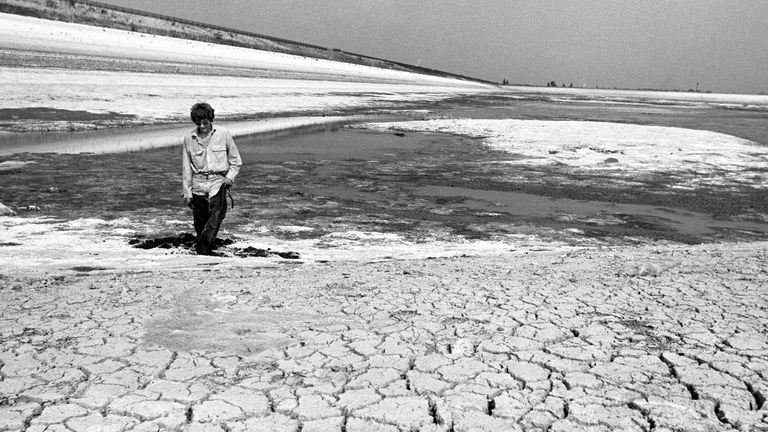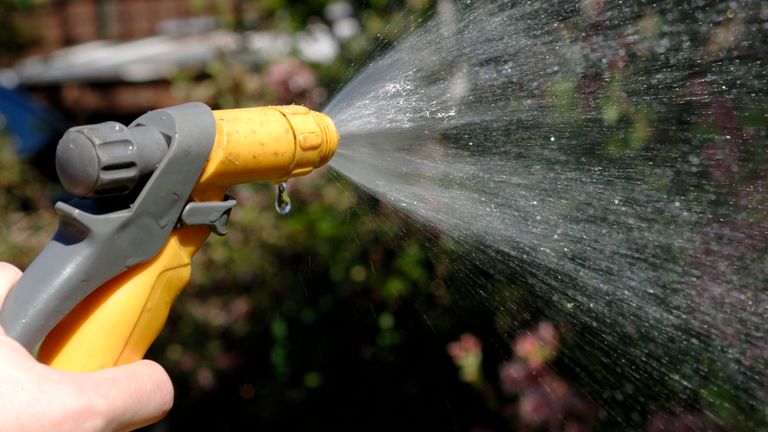Water chiefs are preparing for drought as the Met Office confirmed England's driest eight month period since 1976.
Officials at the Environment Agency (EA) are transferring water to low running rivers, rescuing fish and reoxygenating water, while water companies are implementing the early stages of their drought plans.
The National Drought Group of farmers, water companies and land users met this morning and have urged people to conserve water, including by swapping baths for showers, re-using water used to rinse vegetables and keeping cold water in the fridge to avoid running the tap.
"Don't wait for it to happen," said John Leyland, EA's chief of staff, urging people to start conserving water.
"This is how drought starts. The continued hot and dry weather may lead to more environmental problems in August," he said, adding water companies do have sufficient supplies for summer.
It comes as the Royal Meteorological Society told Sky News drought was now "very likely" for the majority of the south of England and Wales.
"Based on the forecast... it really feels like we've got some trouble ahead with the lack of rainfall," chief executive Liz Bentley told Sky News.
November 2021 to June 2022 was the driest in England since the same period in 1975-76, the Met Office confirmed today, and last week's record-breaking mega heatwave exacerbated the already parched earth.
The dry weather has left most of England, apart from the North West, in "prolonged dry weather" status, the first of four drought categories.
Whether areas fall into the second "drought" stage hinges on when the rain returns, and whether it adds up to more or less than usual. The last drought periods were in 2018/2019 and 2011-12.
Read more:
Where does our water come from, where do we use it most and what happens during a drought?
"Where the the lack of rainfall has been most prevalent over recent months in the southern half of the UK, is where we're not likely to see much rainfall in the coming days," Ms Bentley said.
Anywhere south of the Welsh coastal village of Aberporth in the west, to The Wash in East Anglia, is "really struggling with persistent months where we've had below average rainfall," she said, with the problem growing more acute the further towards the South East.
The UK is getting hotter as human activity changes the climate. While drought is not expected to become more frequent or severe in the next few decades, according to climate models it will become more severe, intense and frequent in the second half of this century.
The North West tends to be wetter because it is on the front end of the prevailing weather system that arrives from the Atlantic.
Watch the Daily Climate Show at 3.30pm Monday to Friday, and The Climate Show with Tom Heap on Saturday and Sunday at 3.30pm and 7.30pm.
All on Sky News, on the Sky News website and app, on YouTube and Twitter.
The show investigates how global warming is changing our landscape and highlights solutions to the crisis.
https://news.google.com/__i/rss/rd/articles/CBMikAFodHRwczovL25ld3Muc2t5LmNvbS9zdG9yeS9jbGltYXRlLWNoYW5nZS1kcm91Z2h0LXZlcnktbGlrZWx5LWZvci1zb3V0aC1vZi1lbmdsYW5kLWFuZC13YWxlcy1hZnRlci1kcmllc3QtZWlnaHQtbW9udGgtcGVyaW9kLXNpbmNlLTE5NzYtMTI2NTk1MDPSAZQBaHR0cHM6Ly9uZXdzLnNreS5jb20vc3RvcnkvYW1wL2NsaW1hdGUtY2hhbmdlLWRyb3VnaHQtdmVyeS1saWtlbHktZm9yLXNvdXRoLW9mLWVuZ2xhbmQtYW5kLXdhbGVzLWFmdGVyLWRyaWVzdC1laWdodC1tb250aC1wZXJpb2Qtc2luY2UtMTk3Ni0xMjY1OTUwMw?oc=5
2022-07-26 16:07:30Z
1509791774


Tidak ada komentar:
Posting Komentar